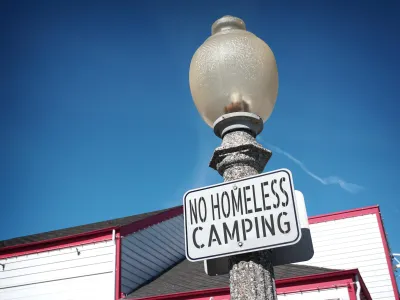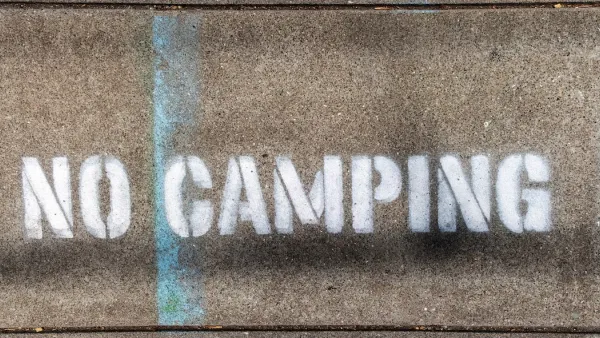A new study shines a light on the connection between homeless outreach teams and policing, and examines why so many cities still use resident complaints to guide their response to the homelessness crisis.

The way to resolve homelessness is to provide people with housing. But many cities continue to use punitive approaches, including deploying police to clear encampments. These policies can and often do coexist with ostensible “services,” sometimes introduced through city-run homeless outreach teams. Why do so many American cities seem vexed when it comes to homelessness, promising to take a compassionate approach while simultaneously framing unhoused people as a threat to public safety?
A big reason for this is that complaint-driven policies prevail in many cities despite being antithetical to resolving homelessness. Mayors and other political figures fear community blowback, and rather than focusing on the real problem—that people are experiencing homelessness—mayors instead adopt policies designed to placate people who are housed and who do not wish to see unsheltered street homelessness.
These complaint-driven policies, centered around deploying police or sanitation workers to places where public encampments are reported, are oriented around “solving” the problem of visible, unsheltered homelessness and persistent encampments. The forced clearing of encampments—often referred to as “sweeps”—can lead to lost or discarded identification, clothing, medications, or other critical belongings. It can disperse people far from their support network, including family who can check up on them or social workers familiar with their cases. It can also lead to arrests or confrontations with police that can exacerbate their houselessness long-term.
This type of policy is nominally connected to services, until unhoused people discover that the services—including permanent housing or social supports—don’t exist, were not what was promised, or come with curfews and other restrictions that cause them to return to the street in frustration. The end result is that homelessness persists, even grows, and that trust between people living on the street and the city governments purportedly offering them services erodes.
A new report from Boston University, Cornell, and a nonprofit, Community Solutions, reveals the extent of punitive and complaint-driven policies within mayors’ offices and city governments across the country. Building on a 2021 survey of mayors and a previous report on the impact of zoning on homelessness, which found that housing policies are often disconnected from homelessness policies, the report’s authors looked at homeless outreach teams across the country, tracking what their goals and missions are and how they operate.
The report reveals that 76 percent of homeless outreach teams in the nation’s 100 largest cities involve the police. And 59 percent of the outreach teams studied are designed to enforce ...
See the source article below to continue reading.
FULL STORY: Sweeps Aren’t Outreach—Policing Homelessness Still Doesn’t Work

Analysis: Cybertruck Fatality Rate Far Exceeds That of Ford Pinto
The Tesla Cybertruck was recalled seven times last year.

National Parks Layoffs Will Cause Communities to Lose Billions
Thousands of essential park workers were laid off this week, just before the busy spring break season.

Retro-silient?: America’s First “Eco-burb,” The Woodlands Turns 50
A master-planned community north of Houston offers lessons on green infrastructure and resilient design, but falls short of its founder’s lofty affordability and walkability goals.

Test News Post 1
This is a summary

Analysis: Cybertruck Fatality Rate Far Exceeds That of Ford Pinto
The Tesla Cybertruck was recalled seven times last year.

Test News Headline 46
Test for the image on the front page.
Urban Design for Planners 1: Software Tools
This six-course series explores essential urban design concepts using open source software and equips planners with the tools they need to participate fully in the urban design process.
Planning for Universal Design
Learn the tools for implementing Universal Design in planning regulations.
EMC Planning Group, Inc.
Planetizen
Planetizen
Mpact (formerly Rail~Volution)
Great Falls Development Authority, Inc.
HUDs Office of Policy Development and Research
NYU Wagner Graduate School of Public Service




























